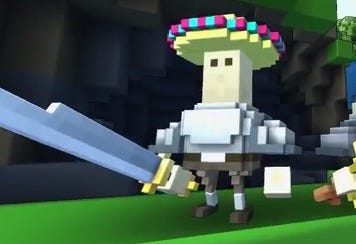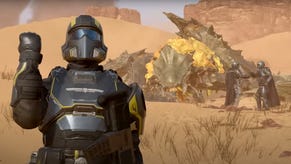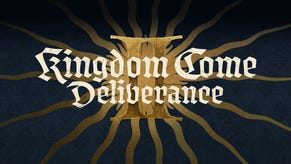Trove: Minecraft copycat or the evolution of a genre? Trion responds
Trove is the voxel-based creation and questing game from Trion Worlds that bears many initial similarities to Minecraft. Dave Cook speaks with the team to get their thoughts on claims that they're ripping off Mojang, and more.
”It’s simply impossible to argue that Minecraft hasn’t spawned its own set of followers, from those that have gotten a lot of attention like Cube World and Terraria to some of the smaller ones like Vox and Mythruna.”
Trion Worlds unveiled Trove back in December. It's a free-to-play sandbox title that offers the crafting freedom of Minecraft along with such RPG staples as weapons, monsters and loot. At first glance it appears to be yet another game attempting to ride Mojang's coattails and cash-in on the voxel craze, but look a little closer and you might just find evidence of something bigger and more ambitious lurking below those familiar cubes.
The developer's vision is one of procedurally-generated dungeons and rolling plains filled with mystery and fantasy adventure, where co-op players can unearth hidden secrets or pool their creative efforts to craft something the whole world can enjoy. It sounds like a grand extension of the voxel template, but you have to admit; you instantly thought of Minecraft when you looked at the image above, didn't you?
It's possible that the popularisation of the voxel format through Minecraft's runaway success will cause all new games in the sub-genre to be compared to Mojang's opus. So entrenched is the vision of those blocky horizons that it's hard to refrain from making such direct comparisons, but should Trove be condemned for trying to explore new ways to evolve that space? One could argue that the never-ending war between military shooters is similar, but few seem to be complaining.
Intrigued by the Trove concept; I spoke with designer Andrew Krausnick over email about accusations that the team is ripping off Minecraft, and to get a better handle on what, exactly, sets it apart. I opened with the copy-cat claims off the bat, and he was more than happy to discuss the issue with me.
"I think that we're in good company on this front," Krausnick began. "Cubic voxel style games like Minecraft aren't just a game or two anymore; they're undeniably a growing genre. Every single one of these games, including Trove, owes a debt to Minecraft for showing how much fun it could be to play with cubes. Once you get into the game, I think you’ll see how different we are.
"In short, though: we are building a game that, at its core, is an exploration and adventure game with fully functional construction and destruction along with a huge helping of cooperative gameplay, all hosted on our own servers to make the experience easy and accessible for people to jump into quickly. That’s a totally new and uncharted area and we’re hoping to make something awesome with it."
"We’re focusing on progression and action combat. We intend to constantly add new classes throughout development and making sure there’s always something to gain or do."
He added, "It's simply impossible to argue that Minecraft hasn't spawned its own set of followers, from those that have gotten a lot of attention like Cube World and Terraria to some of the smaller ones like Vox and Mythruna. Minecraft has inspired countless developers and I think it has been incredible to see what it has pushed us all to create."
We've seen a recent trend of clone victims stepping forward, as well as cloning teams exposed for their plagiarism. Candy Crush Saga developer King was recently outed after it commissioned a re-skin of indie title Scamperghost, while issues surrounding the impact of Flappy Bird clones has opened this area up to further debate. Are the lines between clones and games inspired by others becoming blurred where Trove is concerned?
I invited Krausnick to set out Trove's stall, and to really underline what it is that sets Trion's sandbox apart from the rest of the voxel pack. "We've made a few core decisions that are driving the rest of our design," he replied. "We wanted to make a game that is persistent and online - it's in our DNA at Trion - a game where you can log in from anywhere, play your character, and connect to your friends easily. Also we thought that the procedural adventure side of content creation was so powerful and cool that we wanted to make it part of the core gameplay loop.
"The way the players gain power and rewards is actually by winning worlds: this causes them to be destroyed and new ones to start up. This means we as a dev team can spend worthwhile time making new types of content for each fresh world and creating rule sets for not only new worlds but also new adventure experiences - like dungeons, towers, castles - that are meaningfully different each time a new world is created. On top of that that we're focusing on progression and action combat. We intend to constantly add new classes throughout development and making sure there's always something to gain or do."
"We’re trying a new form of development for us at Trion. It has been both thrilling and sometimes a little exhausting; though at this point I can say we’ve had no regrets."
Trove is in early alpha, so its currently unclear how diverse these different world-winning conditions are, but the notion of procedurally different, always unique worlds with varying rule-sets and creations pulled in from the community certainly seems to extend the foundation laid down by Trion's genre peers. The prospect of RPG character progression adds another layer of depth to the format, and appears to build upon the concept triggered by fellow voxel title Cube World.
Crafting in Trove works as you'd expect; with one or more players building objects using blocks out in the world. You can also fight a range of fantasy enemies including giants bees, mushroom men and skeletons for item ingredients to make bombs or health potions, among other things. It's clear then that creation ranges from designing a grand castle for you and your mates to call home, to simply topping up your health with a tonic brewed from monster bits. There's a few levels at play.
However; the prospect of other players entering the world and destroying everything you've made is a real concern, but Trion is giving each player their own lot of land called 'Cornerstones' which are both protected, and travel with them into every procedural world they enter. It's your own canvas to do with as you please, and presumably, can serve as a safe staging area before you and your friends venture out into the unknown. Cornerstones can be invite-only, or grouped to allow collaboration between several players. It's a neat concept.
The goal is to make player-creations spawn into the worlds of others, ultimately populating the Trove universe with limitless content. "This is one area where we know it's something we want to do," Krausnick went on, "but it's going to take some development and iteration to get it just right.
We’re going to start this process by opening up our visual asset creation tools to the community and letting them make new pieces of content. It's important to us that the game retains balance and a sense of authorship. This will be a collaborative process where we have a dialog with the community about the types of assets that go into the game and we'll be responsible for implementing them in a way that keeps the game fun and engaging."
"I'd like to note here that we're still in early alpha," he stressed. "We're trying a new form of development for us at Trion which involves putting our game out incredibly early and driving development based on feedback. It has been both thrilling and sometimes a little exhausting; though at this point I can say we’ve had no regrets."
Trove is an evolving concept that will grow with its players' understanding of the creation tools at hand. Crafting is restricted to environmental blocks at the moment, but Krausnick explained that he'd like users to forge their own gear, although it's unclear if that system would go fully cross-world. Those who understand Minecraft's building mechanics should feel right at home from the start however, with plenty of rock to be chipped away by swords or blown up with bombs, and a range of different components at their disposal.
We're currently waiting on alpha access so we can formulate a hands-on opinion of how Trove handles, but in closing I asked Krausnick if Trion was at all worried about the inevitable Minecraft comparisons during the early development stage. "It would be crazy to say that this hasn't been on our minds," he admitted. "Minecraft is a cultural phenomenon and even Notch has said that he never expects to be able to replicate that level of success. We're not going into this looking to make the 'Minecraft-killer'.
"Our approach is to create a new experience and we think that there are enough other people who will be interested in our vision to make the effort worthwhile. That said, this is also where I love that we're a free to play game. Even today, in its early alpha phase, the game already feels and plays unlike anything already out there. I have no doubt that anyone who picks it up will find a new and worthwhile experience and we intend to make it as easy as possible for anyone who needs convincing to come find that out for themselves,"









.jpg?width=291&height=164&fit=crop&quality=80&format=jpg&auto=webp)


